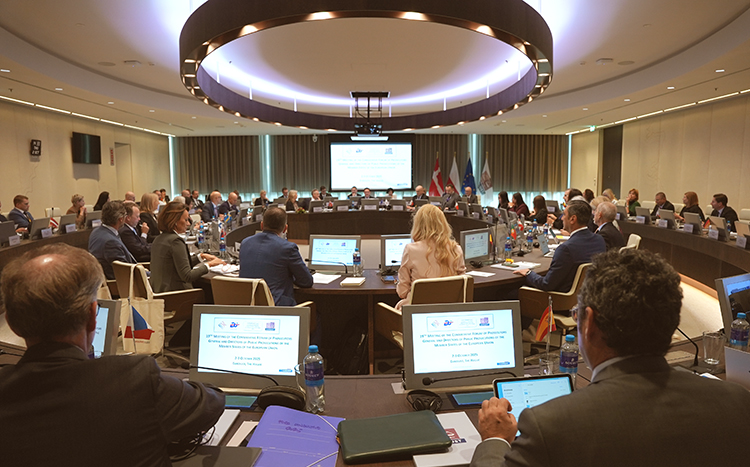The 19th annual Consultative Forum of Prosecutors General of the EU Member States has been largely dedicated this year to the continued fight against organised crime. This included a discussion on the so-called ‘Crime as a Service’ method, or putting up criminal activities for tender. A second major topic was the state of play on the ongoing judicial efforts regarding the war in Ukraine.

The forum, which took place yesterday and today, was hosted by Eurojust and enabled the exchange of a wide range of information and best practices. It was chaired by the Deputy Prosecutor General of Poland and the Danish Director of Public Prosecutions, representing the two countries holding the EU Presidency this year.
Commenting on the 19th Consultative Forum, Eurojust President Mr Michael Schmid emphasised: The Consultative Forum is a crucial meeting for us. It allows the highest representatives of national judicial authorities to come together, discuss different crime threats and give guidance on our work. Eurojust couldn’t be more pleased to have hosted the Prosecutors General from the EU Member States as well as representatives from Europol and the European Public Prosecutor’s Office. It was an honour, as well, to have received Mr Ruslan Kravchenko, Prosecutor General of Ukraine, to review work on our joint judicial response to the war in Ukraine.
Deputy Prosecutor General of Poland, Mr Jaceek Bilewicz, said: Geopolitical turbulence underscores the need for rigorous enforcement of sanctions. Their violation is a crime that undermines stability, justice and our common values. Through the Polish EU Presidency, we call for unity among prosecutorial authorities to ensure that sanctions enforcement serves as a strong safeguard of Europe’s security and legal order.
Director of Public Prosecutions of Denmark, Mr Jan Reckendorff, stated: Criminal organisations are increasingly putting criminal assignments up for tender on social media. The targets of the assignments are often very young people who are willing to take on a given assignment for a fee. Often, the instigators and recruiters are hiding in other Member States or in third countries. The Crime as a Service method is a major challenge for EU Member States and poses a serious threat to society. We must work together to ensure that the suspects are prosecuted and cannot hide in other Member States or third countries.
The Consultative Forum is an annual meeting that provides a platform for the Prosecutors General and Directors of Public Prosecutions from EU Member States to discuss issues of mutual interest and share information, experiences and best practices.
This year’s discussions on Ukraine were related to challenges regarding the violations and circumventions of EU sanctions towards Russia. Prior to the Consultative Forum a dedicated meeting was held on the preparations of a Special Tribunal for the Crime of Aggression against Ukraine.
The Prosecutor General of Ukraine, Mr Ruslan Kravchenko, also provided an update on ongoing investigations into the crime of aggression related to the war in Ukraine. Eurojust hosts the International Centre for the Prosecution of the Crime of Aggression against Ukraine (ICPA) as a judicial hub to support national investigations.
A particular focus of this year’s meeting was on the fight against organised crime groups, often operating on a cross-border scale. This fight is made more difficult by the fact that conflicts between organised crime groups often take place on an international level. This calls for closer cooperation between Member States. Since 2024, Eurojust has hosted the European Judicial Organised Crime Network, which will assist national authorities in this process.
Another part of the Forum was dedicated to the challenges caused by the Crime as a Service method, where criminals, often hiding in other countries, put up for tender serious criminal assignments such as crimes against life. The discussions included extradition from countries outside the European Union for the purpose of criminal prosecution.
Furthermore, the topic of online fake investment and cryptocurrency platforms was discussed.
